新2013母婴保健法
中华人民共和国母婴保健法实施办法(2023年修订)
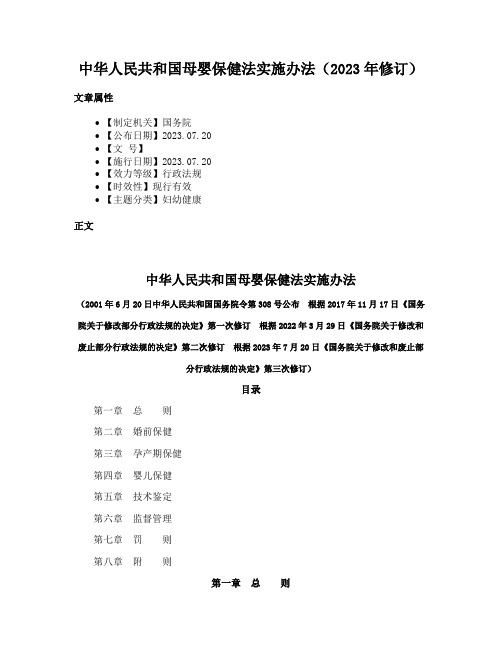
中华人民共和国母婴保健法实施办法(2023年修订)文章属性•【制定机关】国务院•【公布日期】2023.07.20•【文号】•【施行日期】2023.07.20•【效力等级】行政法规•【时效性】现行有效•【主题分类】妇幼健康正文中华人民共和国母婴保健法实施办法(2001年6月20日中华人民共和国国务院令第308号公布根据2017年11月17日《国务院关于修改部分行政法规的决定》第一次修订根据2022年3月29日《国务院关于修改和废止部分行政法规的决定》第二次修订根据2023年7月20日《国务院关于修改和废止部分行政法规的决定》第三次修订)目录第一章总则第二章婚前保健第三章孕产期保健第四章婴儿保健第五章技术鉴定第六章监督管理第七章罚则第八章附则第一章总则第一条根据《中华人民共和国母婴保健法》(以下简称母婴保健法),制定本办法。
第二条在中华人民共和国境内从事母婴保健服务活动的机构及其人员应当遵守母婴保健法和本办法。
第三条母婴保健技术服务主要包括下列事项:(一)有关母婴保健的科普宣传、教育和咨询;(二)婚前医学检查;(三)产前诊断和遗传病诊断;(四)助产技术;(五)实施医学上需要的节育手术;(六)新生儿疾病筛查;(七)有关生育、节育、不育的其他生殖保健服务。
第四条公民享有母婴保健的知情选择权。
国家保障公民获得适宜的母婴保健服务的权利。
第五条母婴保健工作以保健为中心,以保障生殖健康为目的,实行保健和临床相结合,面向群体、面向基层和预防为主的方针。
第六条各级人民政府应当将母婴保健工作纳入本级国民经济和社会发展计划,为母婴保健事业的发展提供必要的经济、技术和物质条件,并对少数民族地区、贫困地区的母婴保健事业给予特殊支持。
县级以上地方人民政府根据本地区的实际情况和需要,可以设立母婴保健事业发展专项资金。
第七条国务院卫生行政部门主管全国母婴保健工作,履行下列职责:(一)制定母婴保健法及本办法的配套规章和技术规范;(二)按照分级分类指导的原则,制定全国母婴保健工作发展规划和实施步骤;(三)组织推广母婴保健及其他生殖健康的适宜技术;(四)对母婴保健工作实施监督。
医院母婴保健规章制度
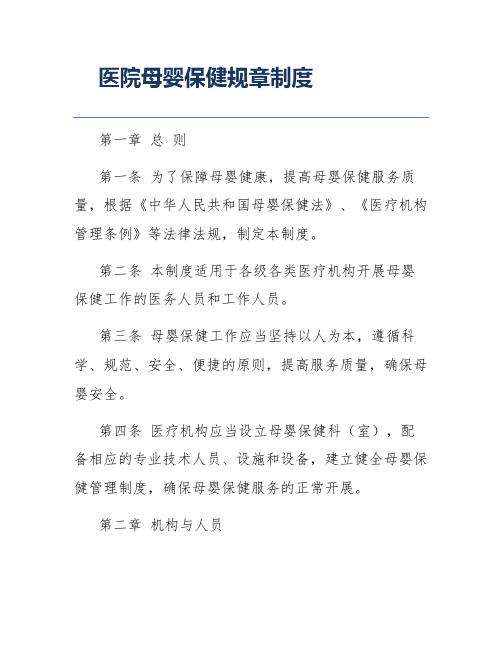
医院母婴保健规章制度第一章总则第一条为了保障母婴健康,提高母婴保健服务质量,根据《中华人民共和国母婴保健法》、《医疗机构管理条例》等法律法规,制定本制度。
第二条本制度适用于各级各类医疗机构开展母婴保健工作的医务人员和工作人员。
第三条母婴保健工作应当坚持以人为本,遵循科学、规范、安全、便捷的原则,提高服务质量,确保母婴安全。
第四条医疗机构应当设立母婴保健科(室),配备相应的专业技术人员、设施和设备,建立健全母婴保健管理制度,确保母婴保健服务的正常开展。
第二章机构与人员第五条医疗机构应当设立母婴保健科(室),明确母婴保健工作的职责和任务,配备相应的专业技术人员和管理人员。
第六条母婴保健科(室)负责人应当具备相应的专业技术职称和管理能力,负责组织、协调和监督母婴保健工作。
第七条母婴保健工作人员应当具备相应的专业技术资格,经过专业培训并考核合格后,方可从事母婴保健工作。
第八条医疗机构应当加强母婴保健人才的培养和引进,提高母婴保健服务人员的整体素质和专业水平。
第三章服务内容与质量第九条母婴保健服务内容包括:孕前保健、孕期保健、分娩期保健、产后康复和新生儿保健等。
第十条母婴保健服务应当遵循科学、规范、安全、便捷的原则,提高服务质量,确保母婴安全。
量控制制度,对母婴保健服务质量进行定期检查和评估,发现问题及时整改。
第十二条母婴保健服务人员应当严格执行母婴保健操作规程和技术规范,确保母婴保健服务的质量和安全。
第四章医疗安全管理第十三条医疗机构应当建立健全医疗安全管理制度,确保母婴保健服务的医疗安全。
第十四条母婴保健服务人员应当严格执行医疗安全操作规程,预防医疗事故的发生。
第十五条医疗机构应当对母婴保健服务过程中发生的医疗事故进行认真调查,分析原因,提出改进措施,并及时报告上级卫生行政部门。
第五章信息管理理制度,确保母婴保健信息的真实、准确、完整和及时更新。
第十七条母婴保健信息包括:孕产妇个人信息、孕期保健记录、分娩记录、产后康复记录、新生儿保健记录等。
四川省《母婴保健法》实施办法
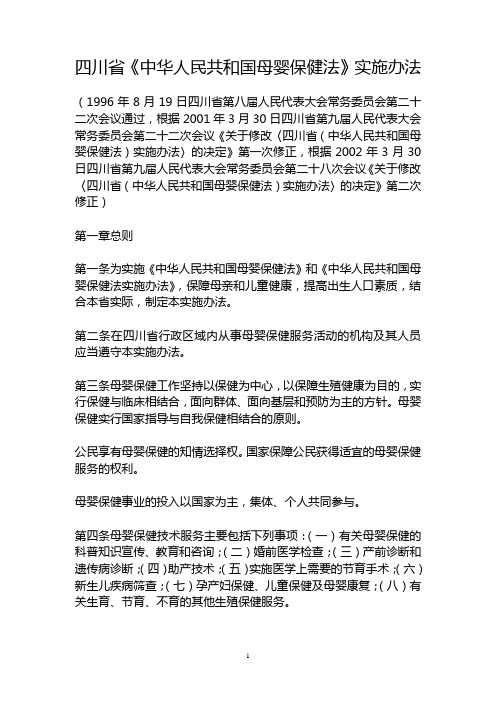
四川省《中华人民共和国母婴保健法》实施办法(1996年8月19日四川省第八届人民代表大会常务委员会第二十二次会议通过,根据2001年3月30日四川省第九届人民代表大会常务委员会第二十二次会议《关于修改〈四川省(中华人民共和国母婴保健法)实施办法〉的决定》第一次修正,根据2002年3月30日四川省第九届人民代表大会常务委员会第二十八次会议《关于修改〈四川省(中华人民共和国母婴保健法)实施办法〉的决定》第二次修正)第一章总则第一条为实施《中华人民共和国母婴保健法》和《中华人民共和国母婴保健法实施办法》,保障母亲和儿童健康,提高出生人口素质,结合本省实际,制定本实施办法。
第二条在四川省行政区域内从事母婴保健服务活动的机构及其人员应当遵守本实施办法。
第三条母婴保健工作坚持以保健为中心,以保障生殖健康为目的,实行保健与临床相结合,面向群体、面向基层和预防为主的方针。
母婴保健实行国家指导与自我保健相结合的原则。
公民享有母婴保健的知情选择权。
国家保障公民获得适宜的母婴保健服务的权利。
母婴保健事业的投入以国家为主,集体、个人共同参与。
第四条母婴保健技术服务主要包括下列事项:(一)有关母婴保健的科普知识宣传、教育和咨询;(二)婚前医学检查;(三)产前诊断和遗传病诊断;(四)助产技术;(五)实施医学上需要的节育手术;(六)新生儿疾病筛查;(七)孕产妇保健、儿童保健及母婴康复;(八)有关生育、节育、不育的其他生殖保健服务。
第五条县级以上地方人民政府领导本行政区域内的母婴保健工作,将母婴保健事业纳入本行政区域国民经济和社会发展计划;逐步增加对母婴保健事业的投入,并设立母婴保健专项资金,对少数民族地区、边远、贫困地区的母婴保健事业给予扶持;在本省行区域内推行母婴保健保偿制度。
鼓励、支持母婴保健领域的教育和科学研究,推广先进、实用的母婴保健技术,普及母婴保健科学知识。
第六条县级以上地方人民政府卫生行政部门主管本行政区域内的母婴保健工作,制定母婴保健工作发展规划和计划,组织推广母婴保健及其他生殖健康的适宜技术,对母婴保健工作实行分级分类指导,并实施监督管理。
保大保小法律规定(3篇)
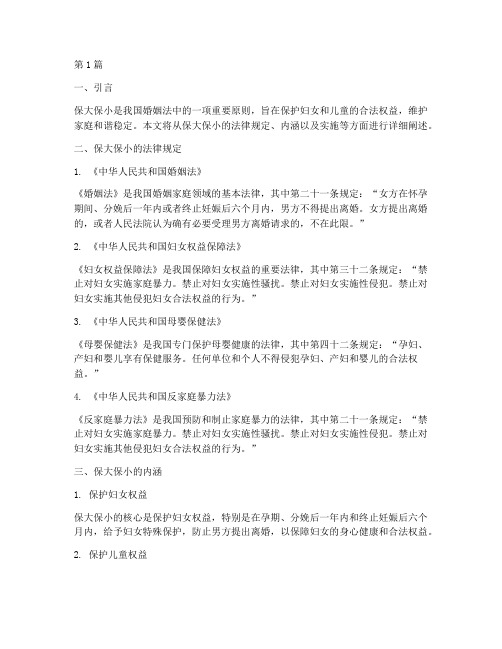
第1篇一、引言保大保小是我国婚姻法中的一项重要原则,旨在保护妇女和儿童的合法权益,维护家庭和谐稳定。
本文将从保大保小的法律规定、内涵以及实施等方面进行详细阐述。
二、保大保小的法律规定1. 《中华人民共和国婚姻法》《婚姻法》是我国婚姻家庭领域的基本法律,其中第二十一条规定:“女方在怀孕期间、分娩后一年内或者终止妊娠后六个月内,男方不得提出离婚。
女方提出离婚的,或者人民法院认为确有必要受理男方离婚请求的,不在此限。
”2. 《中华人民共和国妇女权益保障法》《妇女权益保障法》是我国保障妇女权益的重要法律,其中第三十二条规定:“禁止对妇女实施家庭暴力。
禁止对妇女实施性骚扰。
禁止对妇女实施性侵犯。
禁止对妇女实施其他侵犯妇女合法权益的行为。
”3. 《中华人民共和国母婴保健法》《母婴保健法》是我国专门保护母婴健康的法律,其中第四十二条规定:“孕妇、产妇和婴儿享有保健服务。
任何单位和个人不得侵犯孕妇、产妇和婴儿的合法权益。
”4. 《中华人民共和国反家庭暴力法》《反家庭暴力法》是我国预防和制止家庭暴力的法律,其中第二十一条规定:“禁止对妇女实施家庭暴力。
禁止对妇女实施性骚扰。
禁止对妇女实施性侵犯。
禁止对妇女实施其他侵犯妇女合法权益的行为。
”三、保大保小的内涵1. 保护妇女权益保大保小的核心是保护妇女权益,特别是在孕期、分娩后一年内和终止妊娠后六个月内,给予妇女特殊保护,防止男方提出离婚,以保障妇女的身心健康和合法权益。
2. 保护儿童权益保大保小还体现了对儿童权益的保护,确保婴儿出生后能够得到良好的抚养和教育,避免因家庭矛盾导致儿童权益受损。
3. 维护家庭和谐稳定保大保小有助于维护家庭和谐稳定,通过特殊保护措施,减少家庭矛盾,促进家庭成员之间的相互理解和支持。
四、保大保小的实施1. 法律宣传加强《婚姻法》、《妇女权益保障法》、《母婴保健法》等法律法规的宣传,提高全社会对保大保小原则的认识和重视。
2. 法律援助为遭受家庭暴力的妇女提供法律援助,维护其合法权益。
中华人民共和国母婴保健法实施办法

中华人民共和国母婴保健法实施办法文章属性•【制定机关】卫生部(已撤销)•【公布日期】1995.08.29•【文号】卫生部令[第45号]•【施行日期】1995.08.29•【效力等级】部门规章•【时效性】失效•【主题分类】妇幼健康,妇女保障正文*注:本篇法规已被《卫生部决定废止和宣布失效卫生部令目录》(发布日期:2002年5月8日实施日期:2002年5月8日)宣布失效(原因:已被国务院2001年6月20日发布的《母婴保健法实施办法》(国务院令第308号)代替)中华人民共和国卫生部令第45号现发布《中华人民共和国母婴保健法实施办法》,请各地遵照执行。
部长陈敏章一九九五年八月二十九日中华人民共和国母婴保健法实施办法第一章总则第一条根据《中华人民共和国母婴保健法》(以下简称《母婴保健法》)制定本办法。
第二条母婴保健工作实行以保健为中心、保健和临床相结合,面向群体、面向基层和预防为主的工作方针。
第三条各省、自治区、直辖市在编制年度及中长期财政预算、配置卫生资源时,应当优先扶持母婴保健事业,对边远贫困地区给予特殊支持,以保障母亲和婴儿获得医疗保健服务。
第四条《母婴保健法》第三条第一款规定的各级人民政府领导母婴保健工作是指:(一)将母婴保健事业纳入本地区国民经济和社会发展计划,制定本地区母婴保健工作发展规划,并为规划目标的实现提供政策保障;(二)组织、协调有关部门在各自职责范围内,配合卫生行政部门做好《母婴保健法》的执法监督管理工作;(三)为本地区医疗保健机构贯彻实施《母婴保健法》提供必要条件,物质帮助以及执法的专项经费。
第五条卫生部主管全国母婴保健工作,并对母婴保健工作实施监督管理,其主要职责是:(一)执行《母婴保健法》及本办法;(二)制定《母婴保健法》配套规章及技术规范;(三)按照分级分类指导原则制定全国母婴保健工作发展规划和实施步骤;(四)组织鉴定并推广母婴保健适宜技术;(五)对母婴保健工作进行监督管理。
《母婴保健法》word版

Law of the People's Republic of Chinaon Maternal and Infant Health Care(Adopted at the Tenth Meeting of the Standing Committee of the Eighth National People's Congress on October 27, 1994 and promulgated by Order No.33 of the President of the People's Republic of China on October 27, 1994)ContentsChapter I General ProvisionsChapter II Pre-marital Health CareChapter III Health Care During the Pregnant and Perinatal PeriodChapter IV Technical AppraisementChapter V Administrative ManagementChapter VI Legal LiabilityChapter VII Supplementary ProvisionsChapter IGeneral ProvisionsArticle 1 This Law is formulated in accordance with the Constitution with a view to ensuring the health of mothers and infants and improving the quality of the newborn population.Article 2 The State shall develop the maternal and infant health care undertakings and provide necessary conditions and material aids so as to ensure that mothers and infants receive medical and health care services.The State shall support and assist the maternal and infant health care undertakings in outlying and poverty-stricken areas.Article 3 People's governments at various levels shall exercise leadership in the work of maternal and infant health care.The undertakings of maternal and infant health care shall be included in the plans for national economic and social development.Article 4 The administrative department of public health under the State Councilshall be in charge of the work of maternal and infant health care throughout the country, put forth the guiding principles for the work in different areas and at different administrative levels in light of their specific conditions, and exercise supervision and management of the nationwide work of maternal and infant health care.Other relevant departments under the State Council shall, within the scope of their respective functions and duties, cooperate with the administrative department of public health to make a success of the work of maternal and infant health care.Article 5 The State shall encourage and support education and scientific research in the field of maternal and infant health care, popularize the advanced and practical technique for maternal and infant health care and disseminate the scientific knowledge in this field.Article 6 Awards shall be granted to organizations and individuals that have made remarkable achievements in the work of maternal and infant health care or achieved significant results in scientific research of maternal and infant health care.Chapter IIPre-marital Health CareArticle 7 Medical and health institutions shall provide citizens with pre-marital health-care services.Pre-marital health-care services shall include the following:(1) pre-marital health instruction: education in sex, human reproduction and genetic diseases;(2) pre-marital health consultation: medical advice on matters relating to marriage and child-bearing, etc.; and(3) pre-marital medical examination: medical examination conducted for both the male and female planning to be married to see whether they suffer from any disease that may have an adverse effect on marriage and child-bearing.Article 8 Pre-marital medical examination shall include the examination of the following diseases:(1) genetic diseases of a serious nature;(2) target infectious diseases; and(3) relevant mental diseases.After pre-marital medical examination, the medical and health institution shall issue a certificate of pre-marital medical examination.Article 9 Physicians shall, after pre-marital medical examination, give medical advice to those who are in the infective period of any target infectious disease or who are in the morbid period of any relevant mental disease; both the male and female planning to be married shall postpone their marriage for the time being.Article 10 After pre-marital medical examination, physicians shall, in respect of the male or female who has been diagnosed with certain genetic disease of a serious nature which is considered to be inappropriate for child-bearing from a medical point of view, explain the situations and give medical advice to both the male and the female; those who, with the consent of both the male and the female, after taking long-term contraceptive measures or performance of ligation operations, are unable to bear children may get married. However, the circumstances under which marriage may not be contracted under the Marriage Law of the People's Republic of China shall be excepted.Article 11 Those who have received pre-marital medical examination hold dissenting views on the results of the medical examination may apply for a medical technical appraisement and obtain a certificate of medical appraisement.Article 12 Both the male and the female shall, in making marriage registration, hold their certificates of pre-marital medical examination or certificates of medical technical appraisement.Article 13 The people's governments of provinces, autonomous regions or municipalities directly under the Central Government shall, on the basis of the actual conditions of their respective areas, formulate measures for implementing the pre-marital medical examination system.The people's governments of provinces, autonomous regions or municipalities directly under the Central Government shall fix reasonable rates of charges for pre-marital medical examination. Such charges may be reduced or exempted for people who live in outlying and poverty-stricken areas or people who have true difficulties to pay.Chapter IIIHealth Care During the Pregnant and Perinatal PeriodArticle 14 Medical and health institutions shall provide health-care services to women in their child-bearing age or women during the pregnant and perinatal period.Health-care services during the pregnant and perinatal period shall include the following:(1) instruction on maternal and infant health care: medical advice on breeding healthy offspring and on the pathogenic factors, treatment and prevention of serious genetic diseases and endemic diseases such as the iodine deficiency syndrome;(2) health-care for pregnant women and lying-in women: consultation and instruction on hygiene, nutrition and psychology, etc. and medical health-care services such as regular prenatal physical check-up;(3) health care for the fetus: monitoring care, consultancy and medical advice for the growth of the fetus; and(4) health-care for newborn babies: medical and health-care services for the growth, feeding and nursing of newborn babies.Article 15 Medical and health institutions shall give medical advice to the pregnant women who are suffering from serious illness or are exposed to teratogenic substances, if their gestation may jeopardize the safety of their lives, or seriously affect their health or the normal development of the fetus.Article 16 If a physician detects or suspects that a married couple in their child-bearing age suffer from genetic disease of a serious nature, the physician shall give them medical advice, according to which the said couple shall take corresponding measures.Article 17 After antenatal examination, if a physician detects or suspects an abnormality with the fetus, he shall make pre-natal diagnosis for the pregnant woman.Article 18 If one of the following cases is detected in the pre-natal diagnosis, the physician shall explain the situations to the married couple and give them medical advice on a termination of gestation:(1) The fetus is suffering from a genetic disease of a serious nature;(2) The fetus is with a defect of a serious nature; or(3) Continued gestation may jeopardize the safety of life of the pregnant woman or seriously impair her health, due to the serious disease she suffers from.Article 19 Termination of gestation or performance of ligation operations practised in accordance with the provisions of this Law shall be subject to the consent and signing of the person per se. If the person per se has no capacity for civil conduct, it shall be subject to the consent and signing of the guardian of the person.Whoever is to terminate gestation or receive ligation operations under this Law shall receive such services free of charge.Article 20 In respect of a woman who has given birth to an infant with a serious defect, prior to her second gestation, both the husband and the wife shall receive medical examination in a medical and health institution at or above the county level.Article 21 Physicians and midwives shall strictly observe relevant operational procedures, improve the skills of midwifery and the quality of services so as to prevent or reduce maternal injuries.Article 22 Pregnant women who cannot be hospitalized for delivery shall receive sterilized midwifery by trained and qualified midwives.Article 23 Medical and health institutions and midwives engaged in home delivery shall, as prescribed by the administrative department of public health under the State Council, issue uniformly prepared medical certificates for childbirths, and report to the administrative department of public health, if a lying-in woman or an infant dies or a defective baby is born.Article 24 Medical and health institutions shall provide lying-in women with guidance as to the scientific way of rearing babies, rational nutrition and breastfeeding.Medical and health institutions shall give physical check-up and preventive inoculation to infants, and gradually develop medical and health-care services such as the screening examination of diseases of newborn babies, the prevention and control of frequently occurring and commonly-seen diseases among infants.Chapter IVTechnical AppraisementArticle 25 The local people's governments at or above the county level may establish institutions for medical technical appraisement which shall be responsible for making medical technical appraisement when dissenting views arises on the results of pre-marital medical examination, genetic diseases diagnosis or prenatal diagnosis.Article 26 Personnel engaged in medical technical appraisement must have clinical experience, medical genetic knowledge and the professional title of physician-in-charge or above.Component members of the medical technical appraisement institutions shall be nominated by the administrative departments of public health and engaged by the people's governments at the corresponding levels.Article 27 The challenge system shall be instituted in making medical technical appraisement. Personnel who has an interest in the party concerned, which may affect the impartiality of the appraisement, shall withdraw.Chapter VAdministrative ManagementArticle 28 People's governments at various levels shall take measures to strengthen the work of maternal and infant health care, to improve medical and health-care services, to work hard at preventing and controlling the frequently-occurring endemic diseases, caused by environmental factors, that are seriously jeopardizing the health of mothers and infants, thereby promoting the development of undertakings of maternal and infant health care.Article 29 Administrative departments of public health under the people's governments at or above the county level shall administer the work of maternal and infant health care within their respective administrative areas.Article 30 Medical and health institutions designated by the administrative departments of public health under the people's governments of the provinces, autonomous regions or municipalities directly under the Central Government shall be responsible for monitoring, and providing technical guidance to, the maternal and infant health care within their respective administrative areas.Article 31 Medical and health institutions shall, in accordance with the provisions of the administrative department of public health under the State Council, take the responsibility for the work of maternal and infant health care within the scope of their functions and duties, establish rules and regulations for medical and health care services, raise medical and technological level, and take measures for the convenience of the people so as to provide better services in maternal and infant health care.Article 32 Medical and health institutions that in accordance with the provisions of this Law carry out pre-marital medical examination, genetic disease diagnosis and pre-natal diagnosis, ligation operations and operations for termination of gestation must meet the requirements and technical standards set by the administrative department of public health under the State Council, and shall obtain the permission of the administrative departments of public health under the local people's governments at or above the county level.Sex identification of the fetus by technical means shall be strictly forbidden, except that it is positively necessitated on medical grounds.Article 33 Personnel engaged in making genetic disease diagnosis or pre-natal diagnosis as provided by this Law must pass the examination of the administrative department of public health under the people's government of the province, autonomous region or municipality directly under the Central Government, and obtain a corresponding qualification certificate.Personnel engaged in making pre-marital medical examination, performing ligation operations or operations for termination of gestation as provided by this Law and persons engaged in home delivery must pass the examination of the administrative department of public health under the people's government at or above the county level, and obtain a corresponding qualification certificate.Article 34 Personnel engaged in the work of maternal and infant health care shall strictly abide by the professional ethics and keep secrets for the parties concerned.Chapter VILegal LiabilityArticle 35 Where anyone who has not obtained a relevant qualification certificate issued by the State commits any of the following acts, the administrative department of public health under the local people's government at or above the county level shall stop such act and give a warning to or impose a fine upon him in light of the circumstances:(1) to engage in pre-marital medical examination, genetic disease diagnosis, pre-natal diagnosis or medical technical appraisement;(2) to perform operations for termination of gestation; or(3) to issue relevant medical certificate as stipulated by this Law.The relevant medical certificate as mentioned in item (3) of the preceding paragraph shall be null and void.Article 36 Where anyone who has not obtained relevant qualification certificate issued by the State performs operations for termination of gestation or terminates gestation by other means, thus causing death, disability, loss or basic loss of working ability, shall be investigated for criminal responsibility according to the provisions of Article 134 and Article 135 of the Criminal Law.Article 37 Where personnel engaged in the work of maternal and infant health care, in violation of the stipulations of this Law, issue fake medical certificates, or undertake sex identification of the fetus, medical and health institutions or administrative departments of public health shall in light of the circumstances give them administrative sanctions; if the circumstances are serious, they shall be disqualified for practice of their profession according to law.Chapter VIISupplementary ProvisionsArticle 38 The definitions of the following terms as used in this Law are :"Target infectious diseases" refer to AIDS, gonorrhea, syphilis, and leprosy specified in the Law of the People's Republic of China on the Prevention and Treatment of Infectious Diseases, as well as other infectious diseases that are medically considered to have adverse effects on marriage and reproduction;"Genetic diseases of a serious nature" refer to diseases that are caused by genetic factors congenitally, that may totally or partially deprive the victim of the ability to live independently, that are highly possible to recur in generations to come, and that are medically considered inappropriate for reproduction;"Relevant mental diseases" refer to schizophrenia, manic-depressive psychosis and other mental diseases of a serious nature; and"Pre-natal diagnosis" refers to diagnosis of the fetus regarding its congenital defect and hereditary diseases.Article 39 This Law shall go into effect as of June 1, 1995.欢迎您的下载,资料仅供参考!。
中华人民共和国母婴保健法内容讲解

中华人民共和国母婴保健法内容讲解
首先,母婴保健法规定了孕产妇和婴幼儿的基本权益。
根据法律规定,孕产妇和婴幼儿有权获得医疗、预防、护理和康复等服务,享有生育、户籍登记、教育和社会保障等权益。
公民、法人和其他组织必须尊重和保护孕产妇和婴幼儿的合法权益,不得歧视、侵犯他们的权益。
其次,母婴保健法规定了各级政府和有关部门的责任。
根据法律规定,各级政府应当加强对母婴保健工作的组织领导,制定和实施相应的政策措施,加强医疗卫生服务和预防保健工作。
有关部门要加强对母婴健康事业的指导和监督,推动医疗机构和医护人员提高服务质量,保障孕产妇和婴幼儿的健康权益。
再次,母婴保健法规定了孕产妇和婴幼儿的健康服务和保健措施。
根据法律规定,孕产妇和婴幼儿应当接受相关的健康检查,及时发现和治疗疾病,确保母婴健康。
医疗机构和护理人员要加强对孕产妇和婴幼儿的护理和指导,提供必要的预防保健服务,保护他们的生命安全及身体健康。
此外,母婴保健法规定了生育服务和家庭规划工作。
根据法律规定,政府和有关部门要加强生育服务和家庭规划宣传,普及生殖健康知识,推动生育保健和家庭规划工作的开展。
同时,支持和鼓励符合条件的夫妇生育优质后代,提供相应的生育奖励和保健服务。
综上所述,母婴保健法是我国在促进母婴健康事业发展方面制定的一项重要法律法规,具有重要的现实意义和深远的历史意义。
通过全面贯彻执行母婴保健法,可以增强孕产妇和婴幼儿的健康意识,提高生育率和人口素质,促进全民健康事业的发展,实现经济社会的可持续发展目标。
希望全社会能够共同努力,切实保护和促进孕产妇和婴幼儿的健康,为我国建设健康中国作出积极贡献。
母婴安全)

母婴安全、降低孕产妇死亡率和妇幼卫生的有关综合性规定一、《母婴保健法》的有关规定1994年10月27日《中华人民共和国母婴保健法》(以下简称《母婴保健法》)由第八届全国人民代表大会常务委员会第十次会议正式通过并颁行,这是建国以来对母亲和婴儿保护的最重要的立法,它的颁行,必将对中国保护下一代的健康,提高整个中华民族出生人口的素质产生极为深远的影响。
《母婴保健法》开宗明义,第1条“为了保障母亲和婴儿健康,提高出生人口素质,根据宪法,制定本法”,揭示了母婴保健立法的必要性和总主题。
《母婴保健法》的立法意义在于,它是保障下一代健康的重要立法,是强化妇幼保健工作的重要立法,是维护妇女权益的重要立法。
《母婴保健法》是继《婚姻法》、《妇女权益保障法》颁行后维护妇女权益的又重要立法,三者共同成为我国维护和保障妇女权益的三大法律支柱。
《母婴保健法》的立法指导原则主要体现在三方面:1.从实际出发,分级分类指导的原则;2.坚持医学指导和提供保健措施保障母婴健康的原则;3.明确权利义务关系,实行严格的管理制度。
《母婴保健法》分章对婚前保健、孕产期保健、技术鉴定、行政管理和法律责任作了规定。
该法强调医疗保健机构应当为公民提供婚前保健服务,包括婚前卫生指导、婚前卫生咨询、婚前医学检查等;医疗保健机构应当为育龄妇女和孕产妇提供孕产期保健服务,包括母婴保健指导、孕产妇保健、胎儿保健、新生儿保健。
该法规定县级以上地方人民政府可以设立医学技术鉴定组织,负责对婚前医学检查、遗传病诊断和产前诊断结果有异议的进行医学技术鉴定。
该法强调各级人民政府应当采取措施,加强母婴保健工作,提高医疗保健服务水平,积极防治由环境因素所致严重危害母亲和婴儿健康胯地方性高发性疾病,促进母婴保健事业的发展。
为了保护公民的生命健康权,《母婴保健法》还确立了严格的处罚制裁制度,即对从事母婴保健工作人员违反该法规定,出具有关虚假医疗证明或进行胎儿性别鉴定的给予行政处分的制度;对未经考核取得从事母婴保健工作资格人员擅自从事婚前检查、遗传病诊断及产前诊断、施行终止妊娠手术等给予相应的行政处罚的制度;对未取得从事该项业务工作的合格证书,施行终止妊娠手术或采取其他方法终止妊娠致人死亡、残疾、丧失或基本丧失工作能力的依照刑法有关条文追究刑事责任的制度。
母婴保健法管理细则(全文)
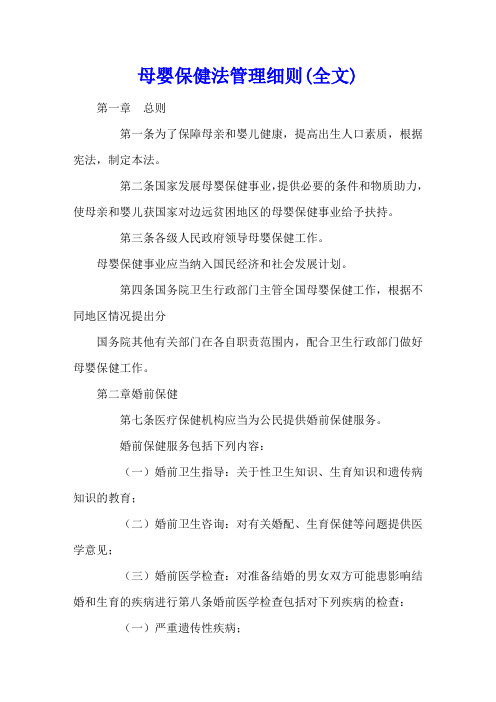
母婴保健法管理细则(全文) 第一章总则第一条为了保障母亲和婴儿健康,提高出生人口素质,根据宪法,制定本法。
第二条国家发展母婴保健事业,提供必要的条件和物质助力,使母亲和婴儿获国家对边远贫困地区的母婴保健事业给予扶持。
第三条各级人民政府领导母婴保健工作。
母婴保健事业应当纳入国民经济和社会发展计划。
第四条国务院卫生行政部门主管全国母婴保健工作,根据不同地区情况提出分国务院其他有关部门在各自职责范围内,配合卫生行政部门做好母婴保健工作。
第二章婚前保健第七条医疗保健机构应当为公民提供婚前保健服务。
婚前保健服务包括下列内容:(一)婚前卫生指导:关于性卫生知识、生育知识和遗传病知识的教育;(二)婚前卫生咨询:对有关婚配、生育保健等问题提供医学意见;(三)婚前医学检查:对准备结婚的男女双方可能患影响结婚和生育的疾病进行第八条婚前医学检查包括对下列疾病的检查:(一)严重遗传性疾病;(二)指定传染病;(三)有关精神病。
经婚前医学检查,医疗保健机构应当出具婚前医学检查证明。
第三章孕产期保健第十四条医疗保健机构应当为育龄妇女和孕产妇提供孕产期保健服务。
孕产期保健服务包括下列内容:(一)母婴保健指导:对孕育健康后代以及严重遗传性疾病和碘缺乏病等地方病(二)孕妇、产妇保健:为孕妇、产妇提供卫生、营养、心理等方面的咨询和指(三)胎儿保健:为胎儿生长发育进行监护,提供咨询和医学指导;(四)新生儿保健:为新生儿生长发育、哺乳和护理提供医疗保健服务。
第十五条对患严重疾病或者接触致畸物质,妊娠可能危及孕妇生命安全或者可第十六条医师发现或者怀疑患严重遗传性疾病的育龄夫妻,应当提出医学意见第十七条经产前检查,医师发现或者怀疑胎儿异常的,应当对孕妇进行产前诊第十八条经产前诊断,有下列情形之一的,医师应当向夫妻双方说明情况,(一)胎儿患严重遗传性疾病的;(二)胎儿有严重缺陷的;(三)因患严重疾病,继续妊娠可能危及孕妇生命安全或者严重危害孕妇健康的第十九条依照本法规定施行终止妊娠或者结扎手术,应当经本人同意,并签署依照本法规定施行终止妊娠或者结扎手术的,接受免费服务。
《中华人民共和国母婴保健法》

《中华人民共和国母婴保健法》(中华人民共和国主席令第33号)(2017年11月4修正)第一章总则第一条为了保障母亲和婴儿健康,提高出生人口素质,根据宪法,制定本法。
第二条国家发展母婴保健事业,提供必要条件和物质帮助,使母亲和婴儿获得医疗保健服务。
国家对边远贫困地区的母婴保健事业给予扶持。
第三条各级人民政府领导母婴保健工作。
母婴保健事业应当纳入国民经济和社会发展计划。
第四条国务院卫生行政部门主管全国母婴保健工作,根据不同地区情况提出分级分类指导原则,并对全国母婴保健工作实施监督管理。
国务院其他有关部门在各自职责范围内,配合卫生行政部门做好母婴保健工作。
第五条国家鼓励、支持母婴保健领域的教育和科学研究,推广先进、实用的母婴保健技术,普及母婴保健科学知识。
第六条对在母婴保健工作中做出显著成绩和在母婴保健科学研究中取得显著成果的组织和个人,应当给予奖励。
第二章婚前保健第七条医疗保健机构应当为公民提供婚前保健服务。
婚前保健服务包括下列内容:(一)婚前卫生指导:关于性卫生知识、生育知识和遗传病知识的教育;(二)婚前卫生咨询:对有关婚配、生育保健等问题提供医学意见;(三)婚前医学检查:对准备结婚的男女双方可能患影响结婚和生育的疾病进行医学检查。
第八条婚前医学检查包括对下列疾病的检查:(一)严重遗传性疾病;(二)指定传染病;(三)有关精神病。
经婚前医学检查,医疗保健机构应当出具婚前医学检查证明。
第九条经婚前医学检查,对患指定传染病在传染期内或者有关精神病在发病期内的,医师应当提出医学意见;准备结婚的男女双方应当暂缓结婚。
第十条经婚前医学检查,对诊断患医学上认为不宜生育的严重遗传性疾病的,医师应当向男女双方说明情况,提出医学意见;经男女双方同意,采取长效避孕措施或者施行结扎手术后不生育的,可以结婚。
但《中华人民共和国婚姻法》规定禁止结婚的除外。
第十一条接受婚前医学检查的人员对检查结果持有异议的,可以申请医学技术鉴定,取得医学鉴定证明。
母婴保健法相关法规

母婴保健法相关法规
母婴保健法规律可根据国别和地区的不同而存在差异。
以下是一些国际上常见的母婴保健法规:
1. 预防未婚妇女和孕妇性别歧视法案:这些法案旨在保护未婚妇女和孕妇免受性别歧视,并确保他们能够获得平等的医疗和保健服务。
2. 婚育登记法:这些法律要求父母必须在婚前或婚后一定期限内进行婚育登记,以确保他们能够获得适当的医疗和保健服务,以及婚姻和家庭援助。
3. 母子保健法:这些法律旨在确保孕产妇和新生儿能够获得适当的保健和医疗服务。
这些法规通常包括提供孕前保健,产前保健,产后保健和新生儿保健等内容。
4. 儿童福利法:这些法律旨在保护儿童的权益和福利,并确保他们能够获得适当的医疗和保健服务。
这些法规通常包括提供儿童保健,儿童福利援助和儿童健康教育等内容。
5. 疫苗接种法:这些法律旨在确保孩子能够接种必需的疫苗,以预防传染病和提高免疫力。
这些法规通常规定了疫苗接种的时间表和具体要求。
6. 婴儿配方奶粉法规:这些法规旨在确保市场上销售的婴儿配方奶粉符合营养需要并符合食品安全标准。
这些法规通常包括生产,销售和标识等方面的要求。
这些母婴保健法规的具体内容和实施方式可能因国家和地区的不同而有所差异。
应当根据当地法律法规进行检索以获得最新和准确的信息。
第九章 母婴保健法律制度
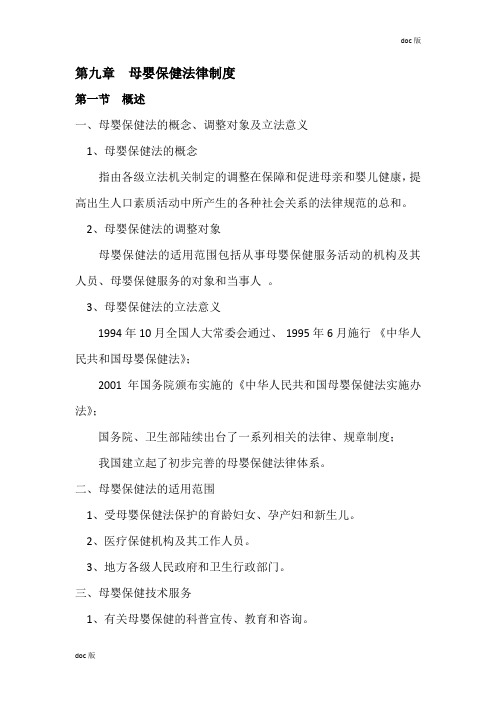
第九章母婴保健法律制度第一节概述一、母婴保健法的概念、调整对象及立法意义1、母婴保健法的概念指由各级立法机关制定的调整在保障和促进母亲和婴儿健康,提高出生人口素质活动中所产生的各种社会关系的法律规范的总和。
2、母婴保健法的调整对象母婴保健法的适用范围包括从事母婴保健服务活动的机构及其人员、母婴保健服务的对象和当事人。
3、母婴保健法的立法意义1994年10月全国人大常委会通过、1995年6月施行《中华人民共和国母婴保健法》;2001年国务院颁布实施的《中华人民共和国母婴保健法实施办法》;国务院、卫生部陆续出台了一系列相关的法律、规章制度;我国建立起了初步完善的母婴保健法律体系。
二、母婴保健法的适用范围1、受母婴保健法保护的育龄妇女、孕产妇和新生儿。
2、医疗保健机构及其工作人员。
3、地方各级人民政府和卫生行政部门。
三、母婴保健技术服务1、有关母婴保健的科普宣传、教育和咨询。
2、婚前医学检查。
3、产前诊断和遗传病诊断。
4、助产技术。
5、实施医学上需要的节育手术。
6、新生儿疾病筛查。
7、有关生育、节育、不育的其他生殖保健服务。
第二节婚前保健婚前保健服务是指对准备结婚的男女双方,在结婚登记前所进行的婚前医学检查,婚前卫生指导和婚前卫生咨询服务。
一、婚前保健服务内容1、婚前卫生指导是指对准备结婚的男女双方进行的以生殖健康为核心,与结婚和生育有关的保健知识的宣传教育。
2、婚前卫生咨询包括婚配、生育保健等问题的咨询3、婚前医学检查主要是对男女双方可能影响生育和结婚的疾病进行医学检查。
包括严重遗传性疾病;指定传染病;有关精神病的检查据卫生部统计,2001年,全国实际参加婚检人数879万人,检出对婚姻有影响的传染病患者14万人,其中性传播疾病20000余人,艾滋病病毒携带者和艾滋病病人84人,精神病患者15000多人,严重遗传疾病患者6500人。
2002年婚检的疾病检出率则达9.29%,主要以生殖系统、内科疾病和传染性疾病为主,这一数字意味着每10对新人中就有一对因健康原因应暂缓结婚、不宜结婚、不宜生育等。
产前诊断和产前筛查相关法律法规文件等

10
▪ 第二十二条 生育过严重遗传性疾病或者严重缺陷患儿的,再次妊 娠前,夫妻双方应当按照国家有关规定到医疗、保健机构进行医学 检查。医疗、保健机构应当向当事人介绍有关遗传性疾病的知识, 给予咨询、指导。对诊断患有医学上认为不宜生育的严重遗传性疾 病的,医师应当向当事人说明情况,并提出医学意见。
10.行政审批(服务)事项详细信息表; 11.其他相关法律法规、文件等。
4
《中华人民共和国母婴保健法》 和
《母婴保健法实施办法》
5
颁布时间及实施时间
▪ 《中华人民共和国母婴保健法》
1994年10月27日第八届全国人民代表大会常务委 员会第十次会议通过
1994年10月27日中华人民共和国国家主席令第33 号公布
▪ 《中华人民共和国母婴保健法实施办法》
第一章 总则 第二章 婚前保健 第三章 孕产期保健 第四章 婴儿保健 第五章 技术鉴定 第六章 监督管理 第七章 罚则
7
《母婴保健法》主要相关内容
▪ 目的:第一条 为了保障母亲和婴儿健康,提高出生人口素质; ▪ 制定依据:根据宪法,制定《母婴保健法》; ▪ 主要内容:第三章孕产期保健和第四章行政管理
《母婴保健法实施办法》主要相关பைடு நூலகம்容
▪ 第三条 母婴保健技术服务主要包括下列事项:
1、有关母婴保健的科普宣传、教育和咨询;
2、婚前医学检查;
3、产前诊断和遗传病诊断;
《中华人民共和国母婴保健法》解读
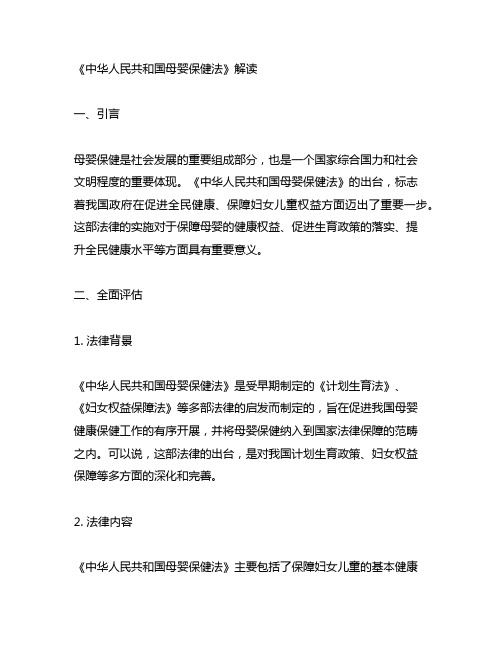
《中华人民共和国母婴保健法》解读一、引言母婴保健是社会发展的重要组成部分,也是一个国家综合国力和社会文明程度的重要体现。
《中华人民共和国母婴保健法》的出台,标志着我国政府在促进全民健康、保障妇女儿童权益方面迈出了重要一步。
这部法律的实施对于保障母婴的健康权益、促进生育政策的落实、提升全民健康水平等方面具有重要意义。
二、全面评估1. 法律背景《中华人民共和国母婴保健法》是受早期制定的《计划生育法》、《妇女权益保障法》等多部法律的启发而制定的,旨在促进我国母婴健康保健工作的有序开展,并将母婴保健纳入到国家法律保障的范畴之内。
可以说,这部法律的出台,是对我国计划生育政策、妇女权益保障等多方面的深化和完善。
2. 法律内容《中华人民共和国母婴保健法》主要包括了保障妇女儿童的基本健康权益、鼓励优生优育、促进母乳喂养、加强孕产期保健等多个方面的内容。
其中,对于婚前保健、孕前保健、产前保健、产后保健等环节都做出规定,着重保障了妇女儿童在生育过程中的健康权益。
法律还规定了政府部门的责任和义务,要求加强对母婴保健工作的监督和指导。
3. 法律意义《中华人民共和国母婴保健法》的出台,为我国母婴保健工作提供了有力的法律依据,有助于改善我国母婴保健领域存在的问题,提升了全民的健康水平。
这部法律的实施还对于促进生育政策的落实、保障妇女儿童的权益有着积极的推动作用。
三、文章内容在《中华人民共和国母婴保健法》的解读中,我们不得不关注法律所涉及的多个方面。
其中,对于婚前保健和孕前保健的规定,不仅是为了保障孕产期女性的健康权益,更是为了培育优良的生育后代。
法律对于母乳喂养的倡导,也是出于对母婴健康的保障。
值得一提的是,法律的实施还明确规定了政府部门的责任和义务,要求政府加强对母婴保健工作的监督和指导,这将有助于完善母婴保健服务体系,更好地服务于广大孕产妇和婴幼儿。
四、总结回顾总体来看,《中华人民共和国母婴保健法》的出台和实施,是我国母婴保健工作的一大进步。
法律规定强制母乳喂养(3篇)
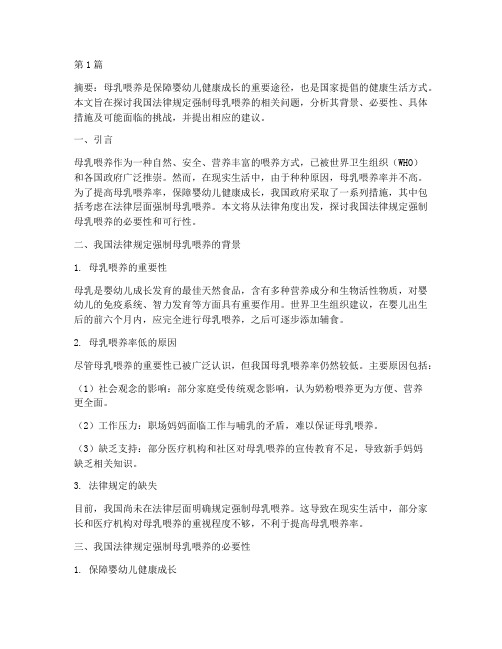
第1篇摘要:母乳喂养是保障婴幼儿健康成长的重要途径,也是国家提倡的健康生活方式。
本文旨在探讨我国法律规定强制母乳喂养的相关问题,分析其背景、必要性、具体措施及可能面临的挑战,并提出相应的建议。
一、引言母乳喂养作为一种自然、安全、营养丰富的喂养方式,已被世界卫生组织(WHO)和各国政府广泛推崇。
然而,在现实生活中,由于种种原因,母乳喂养率并不高。
为了提高母乳喂养率,保障婴幼儿健康成长,我国政府采取了一系列措施,其中包括考虑在法律层面强制母乳喂养。
本文将从法律角度出发,探讨我国法律规定强制母乳喂养的必要性和可行性。
二、我国法律规定强制母乳喂养的背景1. 母乳喂养的重要性母乳是婴幼儿成长发育的最佳天然食品,含有多种营养成分和生物活性物质,对婴幼儿的免疫系统、智力发育等方面具有重要作用。
世界卫生组织建议,在婴儿出生后的前六个月内,应完全进行母乳喂养,之后可逐步添加辅食。
2. 母乳喂养率低的原因尽管母乳喂养的重要性已被广泛认识,但我国母乳喂养率仍然较低。
主要原因包括:(1)社会观念的影响:部分家庭受传统观念影响,认为奶粉喂养更为方便、营养更全面。
(2)工作压力:职场妈妈面临工作与哺乳的矛盾,难以保证母乳喂养。
(3)缺乏支持:部分医疗机构和社区对母乳喂养的宣传教育不足,导致新手妈妈缺乏相关知识。
3. 法律规定的缺失目前,我国尚未在法律层面明确规定强制母乳喂养。
这导致在现实生活中,部分家长和医疗机构对母乳喂养的重视程度不够,不利于提高母乳喂养率。
三、我国法律规定强制母乳喂养的必要性1. 保障婴幼儿健康成长强制母乳喂养有利于提高婴幼儿的生长发育水平,降低婴幼儿患病率,降低医疗费用。
2. 促进社会和谐母乳喂养有利于提高家庭幸福感,降低家庭矛盾,促进社会和谐。
3. 体现国家政策导向强制母乳喂养有利于体现国家对婴幼儿健康的高度重视,有利于推动我国婴幼儿健康事业的发展。
四、我国法律规定强制母乳喂养的具体措施1. 完善法律法规在《中华人民共和国母婴保健法》等法律法规中明确规定强制母乳喂养,明确各方责任和义务。
江苏省实施《中华人民共和国母婴保健法》办法

江苏省实施《中华人民共和国母婴保健法》办法佚名【期刊名称】《中国卫生法制》【年(卷),期】1997(0)4【摘要】第一章总则第一条为了保障母亲和婴儿健康,提高出生人口素质,根据《中华人民共和国母婴保健法》(以下简称《母婴保健法》)和有关法律、法规,结合本省实际,制定本办法。
第二条母婴保健工作实行以保健为中心、保健和临床相结合,面向基层、面向群体和预防为主的方针。
第三条地方各级人民政府应当加强对母婴保健工作的领导,将母婴保健事业纳入国民经济和社会发展计划,对贫困地区的母婴保健事业给予特殊扶持。
县级以上地方人民政府可以设立母婴保健事业发展专项资金。
按照国家规定推行妇幼保健保偿责任制。
第四条县级以上地方人民政府卫生行政部门主管本行政区域内的母婴保健工作,对母婴保健工作实施管理和监督。
县级以上地方人民政府计划、财政、物价、民政、计划生育、公安、劳动、教育、科技等有关部门在各自职责范围内,配合卫生行政部门做好母婴保健工作。
第五条本省行政区域内的任何组织和个人,均应当遵守本办法。
【总页数】4页(P44-47)【关键词】医疗保健机构;婚前医学检查;母婴保健法;卫生行政部门;保健工作;地方人民政府;中华人民共和国;产前诊断;行政区域;医学技术鉴定【正文语种】中文【中图分类】D922.16;D927【相关文献】1.立法促进和保障母婴保健事业新发展——修正《天津市实施〈中华人民共和国母婴保健法〉办法》突出地方特色 [J], 周静文2.安徽省人民代表大会常务委员会关于修改《安徽省实施〈中华人民共和国母婴保健法〉办法》的决定 [J], ;3.天津市实施《中华人民共和国母婴保健法》办法 [J], ;4.立法促进和保障母婴保健事业新发展——《天津市实施〈中华人民共和国母婴保健法〉办法》解读 [J], 天津市卫生健康委5.北京市实施《中华人民共和国母婴保健法》办法 [J],因版权原因,仅展示原文概要,查看原文内容请购买。
- 1、下载文档前请自行甄别文档内容的完整性,平台不提供额外的编辑、内容补充、找答案等附加服务。
- 2、"仅部分预览"的文档,不可在线预览部分如存在完整性等问题,可反馈申请退款(可完整预览的文档不适用该条件!)。
- 3、如文档侵犯您的权益,请联系客服反馈,我们会尽快为您处理(人工客服工作时间:9:00-18:30)。
防为主的工作方针。
二、婚前保健和孕产期保健
婚前保健 1、保健内容: • 婚前卫生指导:关于性卫生知识、生育知识和 遗传病知识的教育; • 婚前卫生咨询:对有关婚配、生育保健等问 题 提供医学意见; • 婚前医学检查:对准备结婚的男女双方可能 患
医师应当提出 医学意见—— 暂缓结婚
医师应当向男女 双方说明情况, 提出医学意见 — —长效避孕、结 扎
孕产期保健
• 医疗保健机构应当为育龄妇女和孕产妇 提供孕产期保健服务。 (第三章 第14 条规定) • 什么是孕产期保健服务? 是指医疗保健机构为育龄妇女和孕产妇 提供的母婴保健指导、孕妇、产妇保健、 胎儿保健、新生儿保健等孕产期的保健 服务。(怀孕开始至产后42天)
我国每年约有80万至120万出生缺陷儿 出生,占全国出生总人口的4%至6%,将 近全球每年出生缺陷儿总量的20%。其中, 约有10万例为神经管畸形。
地中海贫血患者
广东省每年新增4000多名重症地中海贫血儿
腭 裂
连体畸形
美人鱼综合症
无脑儿
越 南 的 橙 剂 孩 子
开放性脊柱裂
母婴保健法的法制建设
《中华人民共和国母婴保健法》1994
年10月27日公布 ,自 1995年6月 1日起施行;
《母婴保健法实施办法》 2001年由国
务院公布。
法律规定
目的:为了保障母亲和婴儿健康,提高出 生人口素质,根据宪法,制定本法。 调整对象:从事母婴保健服务活动的机构 及其人员,母婴保健服务的对象和当事人。
务的机构(经卫生行政部门批准 ,并登记注
册的医疗机构)。
● 婚前医学检查:经设区的市级以上卫生行政 部门许可,取得《母婴保健技术服务执业许可 证》; ● 助产技术服务、结扎手术、终止妊娠手术: 经县级以上卫生行政部门审批,取得《母婴保健 技术服务执业许可证》。 ● 遗传病诊断、产前诊断:经省级卫生行政部 门审批,取得《母婴保健技术服务执业许可证》
1、孕产期保健服务内容:
● 母婴保健指导 ● 孕妇、产妇保健 ● 胎儿保健
● 新生儿保健
2、产前检查诊断: • 对患严重疾病或者接触致畸物质,妊 娠可危及孕妇生命安全或者可能严重 影响孕妇健康和胎儿正常发育的,应 当对孕妇予以医学指导。 •医师发现或怀疑胎儿异常的,应当对 孕妇进行产前诊断。
诊断时发现有下列情形之一的,医师应说 明情况,提出终止妊娠的意见:
• 胎儿患有严重遗传性疾病的;
• 胎儿有严重缺陷的; • 孕妇患有严重疾病和严重遗传性疾病, 继续妊娠可能危及孕妇生命的
3、婴幼儿保健 新生儿疾病筛查、婴幼儿体格检查、预 防接种、多发病和常发病的防治、心理 行为指导、眼保健和牙保健等
医学技术鉴定
鉴定范围:对婚前医学检查、遗传病诊断、 产前诊断方面的结果有疑义,均可申请技术 鉴定。 鉴定组织:母婴保健医学技术鉴定委员会, 分为省、市、县三级。 鉴定的人员:具有较丰富临床经验和相关学 科理论知识及良好医德医风人员组成
影响结婚和生育的疾病进行医学检查。
2、婚前医学检查
• 检查范围: (1)严重遗传性疾病:先天形成,不宜生育; (2)指定传染病:艾滋病、淋病、梅 毒、麻风病等等; (3)有关精神病
经婚前医学检查,医疗保健机 构应当出具婚前医学检查证明
●对患指定传染病 在传染期内; ●者患有关精神 病在发病期内; ●患医学上认为 不宜生育的严重 遗传性疾病
五、法律责任
行政责任: 1、未取得相应的合格证书的 2、取得相应合格证书而违反规定的 民事责任:医疗事故处理办法 刑事责任:刑法
案例 视频: 天津蓟县突发新生儿死亡事件
謝 謝 欣 賞
●《母婴保健技术服务执业许可证》有效期为 3年。有效期满后继续开展母婴保健技术服务 的,由原发证机关重新审核认可。
母婴保健工作人员
● 遗传病诊断、产前诊断:经考核由省、自治 区、直辖市卫生行政部门颁发《母婴保健技术 考核合格证书》 ● 婚前医学检查:由设区的市级以上地方卫生 行政部门负责 ● 助产技术服务、结扎手术和终止妊娠手术: 经考核由县级以上地方卫生行政部门颁发《母 婴保健技术考核合格证书》
严禁采用技术手段对胎儿进行性别鉴定
◆本法规定,严禁采用技术手段对胎儿进行 性别鉴定。 ◆因医学目的需要进行胎儿性别鉴定的,由 省级卫生行政部门指定的医疗保健机构依法 进行。
三、医疗保健机构的法律规定
医疗保健机构:《母婴保健法》规定的医疗
保健机构是指依法开展母婴保健业务的各级
妇幼保健机构以及其它开展母婴保健技术服
母婴保健法
一、概述
母婴保健法定义:是调整保障母亲和 婴儿健康,提高出生人口素质活动中 产生的各种社会关系的法律规范的总 和。
背景: (1)儿童优先,母亲安全已成为国际社 会的共识; (2)目前我国劣生的现象依然很严重
我国出生缺陷监测资料表明,出生缺陷 已逐渐成为发展中国家婴儿和儿童死亡的 主要原因。我国是世界上出生缺陷高发国 家之一,被称为出生缺陷的“珠穆朗玛峰”
●家庭接生:经考核取得县级卫生行政部门 颁发的《家庭接生员技术合格证书》 ●《母婴保健技术考核合格证书》、《家庭 接生员技术合格证书》有效期为3年
四、母婴保健工作管理的法律规定
(一)政府领导母婴保健工作 (二)母婴保健工作管理机构及其职责 国务院卫生行政部门 县级以上卫生行政部门 母婴保健监督员
